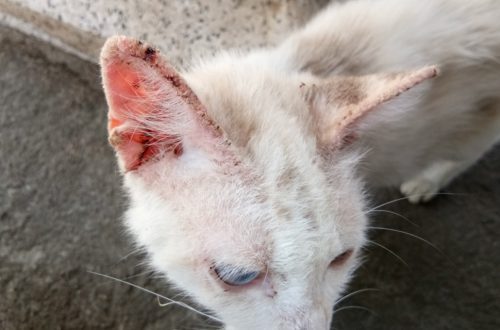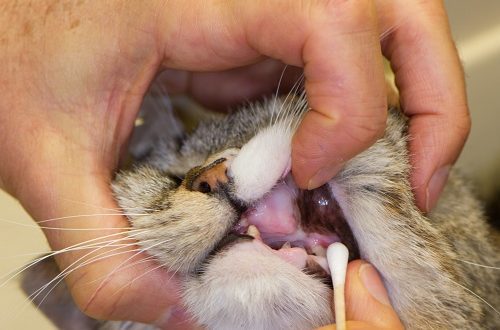
Why does a cat often shake its head?
Contents
Ear mite infestation, or otodectosis
This disease is caused by a microscopic parasitic mite that can live in the ear canal of cats, ferrets and dogs. The ear mite is easily transmitted by contact with a sick animal, and also survives for some time in the environment, which makes infection possible indirectly.
It is common to think that when an ear mite infests a cat’s ears, there will certainly be brown discharge and the cat will scratch its ears a lot, but this is not always the case. In some animals, there is no discharge at all, and the degree of itching can vary greatly in different cats. Most often, domestic cats become infected with ear mites during trips to the country or if a new animal is brought into the house, such as a small stray kitten. Both ears are always affected.
Inflammation of the external auditory canal, or otitis externa
The reason, again, is an infection with an ear mite, which leads to inflammation of the skin of the ear canal and creates conditions for the occurrence of a bacterial or fungal infection. Primary ear canal infections in cats are quite rare. But if the infection has already arisen, then it will not go away on its own.
Foreign body in the ear canal
In this case, the cat will begin to shake its head very suddenly and quite strongly, and there may be a tilt of the head towards the affected ear. Most often, parts of plants get into the ears of cats, especially cereal seeds, insects and cotton wool from ear sticks (in case the owners try to clean the cat’s ears with cotton swabs, which is completely wrong!).
Diseases of the deep parts of the ear – middle and inner
In this case, the outside of the ears may look completely normal and without discharge, but the cat may shake its head and feel bad. Often there is a violation of coordination of movements.
Neoplasms of the skin and glands of the external auditory canal
Usually observed in older cats and is always accompanied by purulent and very foul-smelling discharge. The lesions are usually unilateral. Also, young cats have polyps – neoplasms that can grow in the middle ear. Lesions in this case are usually unilateral.
A cat can shake its head in other diseases that are not related to ear diseases. These can be diseases of the teeth and gums, viral respiratory infections, neurological diseases or chronic systemic diseases such as diabetes, chronic kidney disease, thyroid disease.
What to do if the cat began to shake its head often?
You should not try to make a diagnosis yourself, and even more so run to the nearest pet store and buy drops or tablets. There is a very high chance that you will waste your money and time in vain, and you will not help your cat either.
It is better to make an appointment at the nearest veterinary clinic.
Photo:





